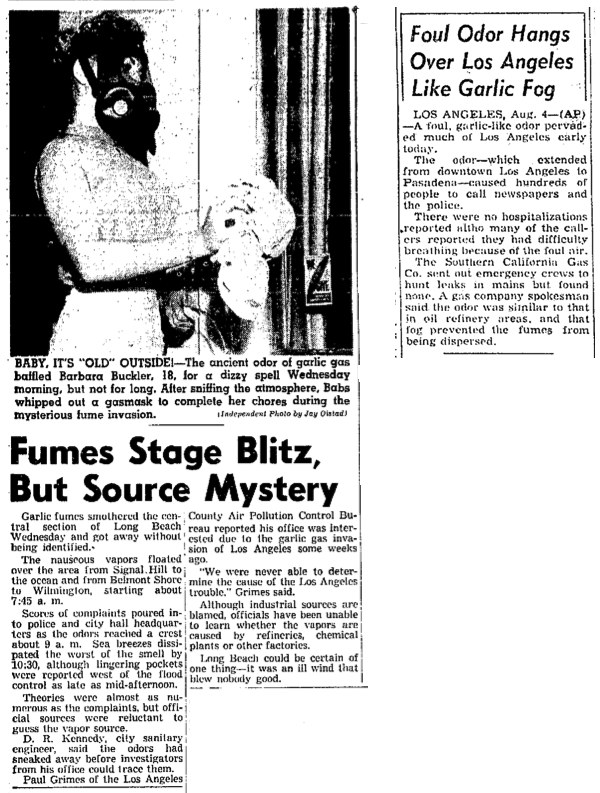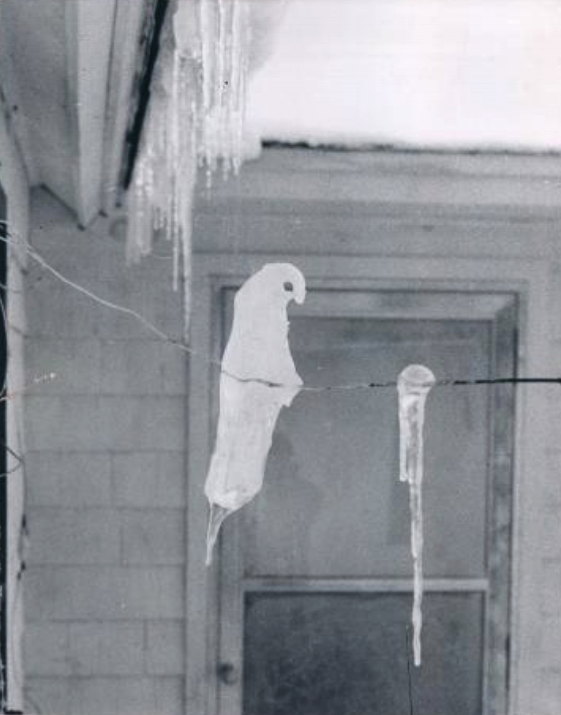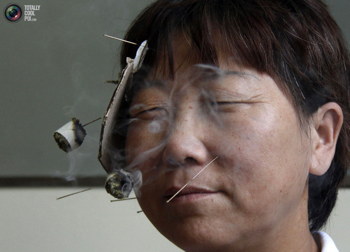Weather
Garlic Fog Invades Los Angeles, 1949
Back in late 1949, people throughout Los Angeles County reported a strong odor that smelled like garlic. The smell persisted for weeks, periodically increasing in intensity. Some residents took to wearing gas masks. There were reports of the fumes being so strong that they discolored fences and buildings. There was a widespred fear that it was a poison gas attack.Despite a lot of speculation, I'm not sure that the source of the mystery odor was ever identified, although leading theories were that it was either coming from the Los Angeles River bed, or from a chemical factory. It became known as the invasion of the Garlic Fog. [Sydney Morning Herald, Aug 7, 1949] (via Buried Words and Bushwa)

Posted By: Alex - Fri Dec 14, 2012 -
Comments (6)
Category: Unsolved Mysteries, 1940s, Weather
An Icicle That Looks Like A Bird

It must have been a slow news day when this photo ran in papers back in 1959. The icicle that looks like a bird was found outside a Detroit home.
Posted By: Alex - Fri Oct 19, 2012 -
Comments (4)
Category: Freaks, Oddities, Quirks of Nature, Nature, Weather, 1950s
Cold Wind Causing Facial Paralysis
A search on Google Scholar reveals that common causes of facial paralysis include Herpes simplex virus, lyme disease, Bell's palsy, and Ramsay Hunt syndrome. But in Shanghai, doctors are reporting numerous cases of facial paralysis caused by the cold autumn wind. Fatigue is also a contributing factor. A Shanghai doctor cautions that, "Elderly people, new mothers, children with weak immunity, and those exposed to cold wind after drinking are the most likely to suffer facial paralysis."It's also reported that the "majority of the patients are male between 20 and 50 years of age." (I'm guessing they're the ones being exposed to the cold wind after drinking.) They're coming into hospitals complaining of sudden paralysis on one side of the face. A little bit of acupuncture and massage, and they're set right. [hillpost.in]

Posted By: Alex - Thu Oct 18, 2012 -
Comments (8)
Category: Health, Medicine, Weather
Play in the Snow
It's still winter, folks!
Posted By: Paul - Tue Jan 19, 2010 -
Comments (2)
Category: Games, Seasonal, Children, Documentaries, 1940s, Weather
Al Kaprielian
Goodbye, Al Kaprielian.
Posted By: Paul - Thu Dec 17, 2009 -
Comments (4)
Category: Eccentrics, Regionalism, Television, Weather
Weird Britannia!
Time to point our telescopes of weirdness at "the old country", methinks.
And it's not just British brains that are shrinking, the UK's sheep are getting smaller as well. Because of a trend towards milder weather believed to be due to climate change, Sheep on the Outer Hebridean island of Soay are getting smaller at the rate of 100g/year, say researchers from Imperial College, London. Though it might seem that warmer winters and a greater abundance of food might make for bigger sheep, Tim Coulson, the professor leading the study, points out that fewer weaker and smaller lambs will die over winter, bringing down the average size (Telegraph).
Now, in some good news, UK campaigners have won a second victory in a three-year battle... to bring back a chocolate bar. The "Wispa Bar", made by European confectioners Cadbury, was introduced in 1995 along with a caramel laced version called the "Wispa Gold", only for both to be discontinued in 2003. This prompted some die-hard fans of the bubbly chocolate bar to start a petition to have it go into production again, resulting in a "limited edition" run of the original Wispa last year. When the 40 million bars produced sold out in just 18 weeks, Cadbury decided to relaunch the brand. Not satisfied with just one bar, campaigners have kept up the pressure, causing Cadbury to start producing Wispa Golds "for a limited period," as before. However to some commentators, this latest move looks more like slick PR than grassroots victory (Sky News).
More in extended >>
Posted By: Dumbfounded - Fri Jul 03, 2009 -
Comments (5)
Category: Animals, Food, Candy, Law, Judges, Nature, Weather, Political Correctness, Religion, Products
Beware the Worm Lizard!
Every day the news brings me reports of some horrible locale outside my safe and beloved New England, where people are subject to floods, volcanoes, earthquakes--and "worm lizards"...?!?Yes, it's not bad enough that the poor citizens of a certain region in Brazil have to battle flooding, they also have to contend with the evil Worm Lizard!
You can read about their troubles here. The key sentence:
Like 218,000 others across a swath of northern Brazil three times the size of Alaska, the neighbors have fled the worst rainfall and flooding in decades, braving newly formed rivers teeming with anacondas, alligators and legless reptiles known as "worm lizards" whose bite is excruciating.
Posted By: Paul - Sun May 10, 2009 -
Comments (3)
Category: Animals, Death, Destruction, Disasters, Horror, South America, Natural Wonders, Weather
Snow Rollers
Who knew that a combination of snow and wind could create "snow rollers"? Not me. NOAA explains that snow rollers are "extremely rare because of the unique combination of snow, wind, temperature and moisture needed to create them. They form with light but sticky snow and strong (but not too strong) winds."(Thanks to Prof. Music)

Posted By: Alex - Sat Apr 18, 2009 -
Comments (4)
Category: Nature, Natural Wonders, Weather
An Aqueous Solution
Posted By: Paul - Tue Apr 07, 2009 -
Comments (5)
Category: Death, Surrealism, Cartoons, North America, Weather
The Adventures of Junior Raindrop
What were they huffing at the Forest Service the day they came up with this?
Posted By: Paul - Wed Nov 12, 2008 -
Comments (3)
Category: Cartoons, Documentaries, Weather

| Who We Are |
|---|
| Alex Boese Alex is the creator and curator of the Museum of Hoaxes. He's also the author of various weird, non-fiction, science-themed books such as Elephants on Acid and Psychedelic Apes. Paul Di Filippo Paul has been paid to put weird ideas into fictional form for over thirty years, in his career as a noted science fiction writer. He has recently begun blogging on many curious topics with three fellow writers at The Inferior 4+1. Contact Us |




